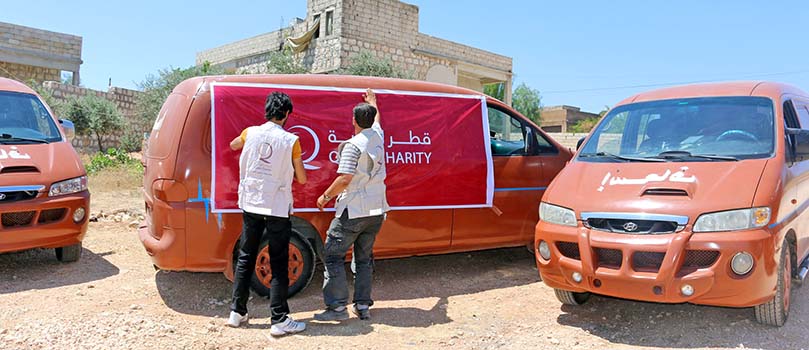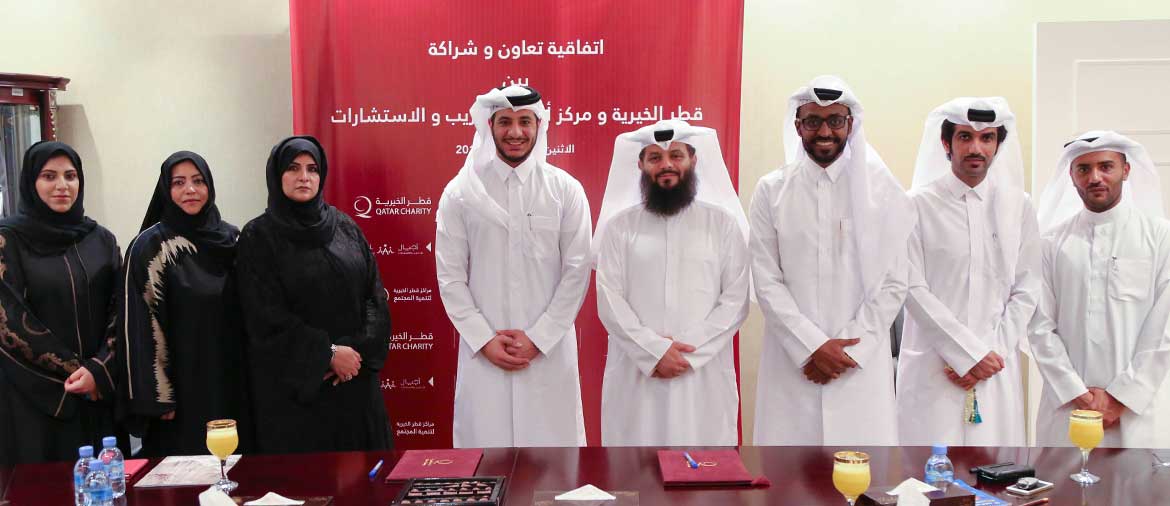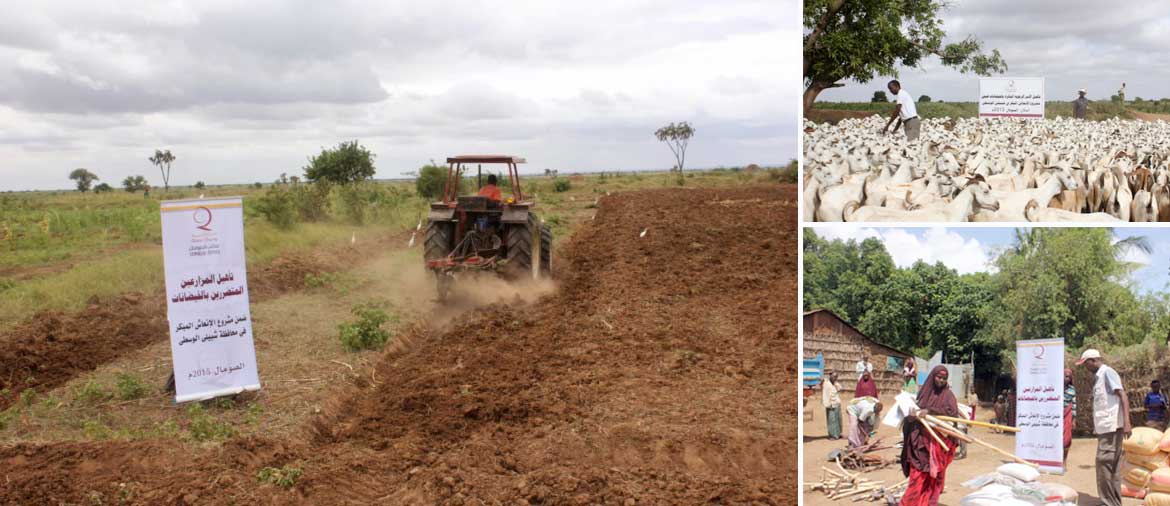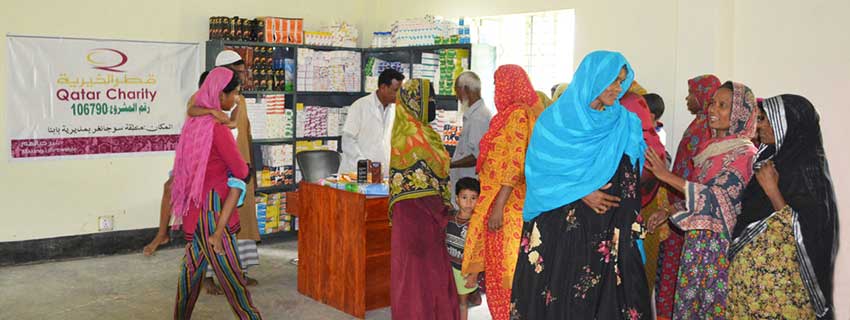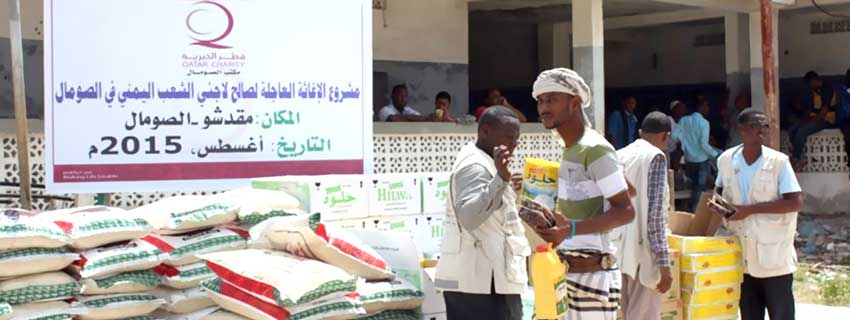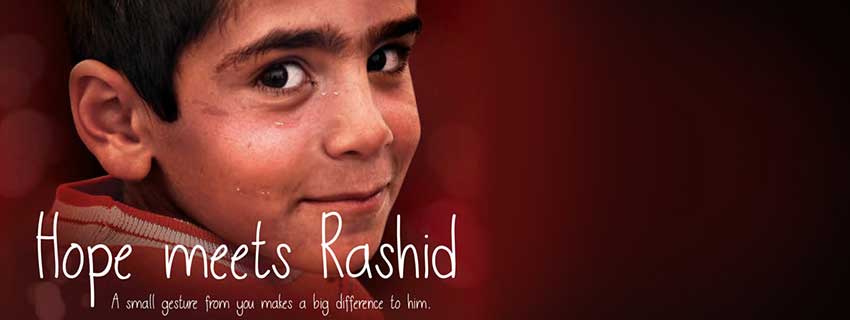QC Continues to Implement Distinguished Agricultural Projects inside Syria
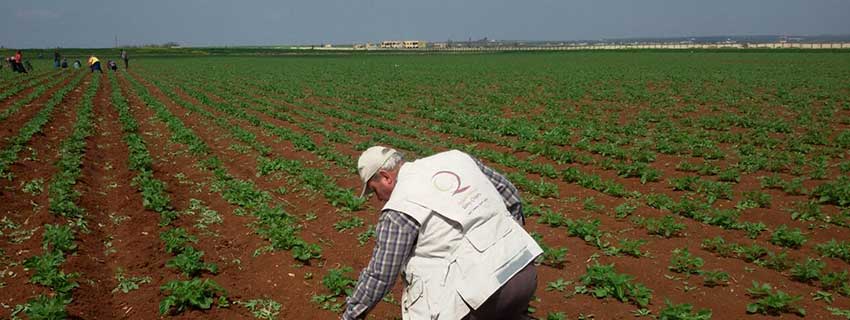
2015-10-13T02:29:42+01:00

- 8 hectares of potato were planted and 133 tons of potato were produced from which 320 families of farmers and laborers benefited
- The farmers of Northern Aleppo harvested 133 tons of potato thanks to QC’s ongoing relief aids whose purpose is to compensate for the food shortage inside Syria.
‘Planting Potato’ project was able to contribute in achieving self-sufficiency for the conflict-affected inside Syria. The project provided the basic foodstuffs at good prices and with good quantities specially that the crisis has been going for long. It provided job opportunities for a number of workers in the field of agriculture so as to satisfy their daily needs and their families’. The project also aimed at making use of the landscapes in a good and useful way.
The implementation of this project took 10 months at a cost of 570,000. 8 hectares of potato were planted and 133 tons were produced. It provided jobs for 320 people.
Renting the Land
Since Syria is in desperate need for foodstuffs, QC made it a priority that 34% of its projects were dedicated for this purpose. It is impossible for anyone to live without food, especially the internally displaced Syrians.
‘Potato Planting’ project, implemented by Beyaz Eller (White Hands), is part of the developmental and food projects which aim at compensating for the shortage in foodstuffs from which the people of Syria suffer. It is also implemented to encourage the farmers to go on with farming and to reform arable lands. Fortunately, many people who are originally from this area or have been displaced to it are experienced in the field of agriculture.
Through this project, 8 hectares of enhanced potato were planted. Plus, a contract was signed with the farmers: QC would rent the land from the farmer and sign a cultivation contract with him; or sign a contract with another farmer who has experience in the field; furthermore, QC would secure irrigation water by using rented wells from the same land.
The engineers supervising these projects are experienced and well-acquainted with the environment of the area. Therefore, it is expected that these projects will result in providing wheat and potato at great prices and with good quantities so as to bridge the food gap in Syria.
Redent Control
In order to prevent any plant diseases and to safely grow crops, QC sprayed nitrogen fertilizers and used weed killers. As a result, the corps turned out really good.
Through this project, 50 hectares of enhanced wheat and potato were planted and the procedures of the implementation of the project were the same as the previous one.
Potato is usually planted in the northern countryside in two main seasons: spring (the most important season) from the 10th of February until the 10th of March; taking into consideration the type and the weather during the time of cultivation; and autumn from the 20th of July until the 20th of August. In comparison with autumn, spring produces twice the amount of crops, which means twice the production.
Wheat Cultivation
It is worth mentioning that QC had already implemented an agricultural project for the benefit of the residents of the countryside of Aleppo, Idlib and Al Sahel in Syria. This project led to the investment in 50 hectares for the cultivation of wheat and potato. It was implemented in cooperation with Beyaz Eller at a cost of 900,000 QR.
4,200,000 displaced Syrians and refugees benefited from QC’s projects, which were implemented at a cost of 205,000,000 QR from April 2011 until January 2015.
You can donate to support such projects through the link: Click here
Related News
QC Distributes 8 Ambulances to
QC Distributes 8 Ambulances to Hospitals inside Syria
Mr. Ibrahim Ali Abdullah, QC’s Director of Relief Department, said, “This project helps save the lives of so many injured and the lives of patients suffering from critical conditions. The ambulances are to provide first aid and to transport the patients to nearby hospitals. However, Syria is suffering from the lack of first aid services, primary health care, and surgeries. The infrastructure of the health field is falling apart! There is also a huge shortage in medical supplies, and medications inside Syria.”
QC distributed ambulances (Hyundai closed Van) to the field hospitals, and charity aid stations in many governorates. It distributed two vans to Al-Ghab plain in Hama’s countryside, two to Aleppo and its countryside, two to Idleb and its countryside, one to Jisr Al-Shughur, and one to the countryside of Lattakia. The project was implemented at a cost of 300,000 QR.
2,000 Benefiting Families:
In the same time QC implemented this project, along with other water and formation relief projects, it sprayed with pesticides a number of the Syrian refugee camps in Arsal, along the Lebanon-Syria border. It was after the temperature rose above its natural average and after the increase of insects’ bites due to the opening of manholes and their exposure to air near the camps. The project was implemented to avoid any diseases which could turn to epidemics because the refugees do not regularly check the manholes.
This initiative was carried out by QC and its associate Union of Relief and Development Associations in Lebanon. 19 camps (13 in Arsal and 6 nearby ones), where almost 2,000 families live, benefited from this project. The pesticides were sprayed on the manholes, where insects and reptiles were concentrated and where garbage was stationed. The results of this initiative were very satisfactory.
QC pays great attention to the relief of the Syrian people, whether the displaced inside or the refugees outside. 4,200,000 people benefited from QC’s projects which were implemented from April 2011 until last January (2015) at a cost of 205,000,000 QR. Since the beginning of the Syrian crisis, QC’s projects included different fields: education, health, food, and shelter. 59% of these aids were sent to inside Syria at a cost of 121,200,000 QR, while the remaining percentage was sent to the refugees in the neighboring countries. 13% of the aids (i.e. 26,889,000 QR) were sent to Jordan, 17% (i.e. 34,660,000 QR) were sent to Lebanon, 9% (i.e. 19,000,000 QR were sent to Turkey, and 2% (i.e. 3,293,000 QR) were sent to Iraq and other places where Syrians took refuge.
Earlier Projects
QC implemented a number of development and relief projects to the Syrian refugees in Lebanon and inside Syria at a cost of 14,000,000 QR (around 3,900,000 USD).
Such as l’nodamed Al-Jerah (Let’s Treat our Wounds) project: the project cost 355,000 USD, and aimed at helping support field hospitals inside Syria, Damascus countryside in specific.
Al-Sondoq Al-Tebbi (the Medical Box) project: it cost 1,200,000 USD and covered all the Lebanese territories. It sponsors the patients’ and injured surgeries whether partly or fully.
Lamset Shifa’ (Healing Touch) project: This project cost 130,000 USD. It sponsored Akkar Health Center in Al-Abda which receives the injured from inside Syria living by the Lebanese border, or living in Lebanon.
Kafalat Al-Jarha (The Injured Sponsorship) project in 24 Health Center: It was implemented in Tripoli at a cost of 190,000 USD.
The Support of the Injured and Affected project: this project was implemented in Beirut, Akkar, Tripoli, Aramoun, and Bechamoun at a cost of 250,000 USD. It and equipped and operated ambulance stations in 5 areas. It included the paramedics, ambulances, and medical devices and essentials.
It is worth mentioning that by the end of last year, QC signed a strategic, universal partnership with International Medical Corps and Qatar Foundation International. This would help amplify their capabilities to reach all the territories, worldwide, which most need aid. It would specially help the conflict-affected people in Syria, and offer health care to the displaced Syrian children who have been striving to save their lives. They strive to live because there aren’t any ordinary services available, nor is there any health care provided. In addition, the residential areas are crowded with people due to the displacement of many, and due to the damages which happened to drinking water infrastructure and the sewage system.
QC Signs a Cooperation Agreeme
QC signed a cooperation agreement with Ajyal Center for Training and Consultancy through which QC’s administration of developmental centers and Ajyal Center would cooperate to offer developmental and social services to the society by organizing activities, events and different programs, and holding training and educational courses.
Mr. Abdul Nasser Al-Zahr Al-Yafi’ee, QC’s Executive Director of Local Development, and Mis. Ghada Ayoush, the Director General of Ajyal Center for Training and Consulting, signed the agreement in Qatar’s office in Duhail.
The signed cooperation agreement stipulates that both parties shall cooperate by sharing their experiences and potentials in the field of developmental and social services so as to provide distinguished community service. They also agreed on mutual coordination to hold several purposeful activities and developmental programs.
Mobilizing Efforts
Mr. Abdul Nasser Az-Zahr Al-Yafi’ee, QC’s Executive Director of Local Development, said that this is part of QC’s efforts to support developmental work; that is related to training and expertise improvement. The goal is to make a quantum leap in that field. He pointed out to the big efforts which must be exerted in order to overcome a lot of obstacles.
Al-Yafi’ee also added that through this agreement with ‘Ajyal’ Center, QC is trying to mobilize all the efforts to achieve the desired goals. The two parties agreed to work together in every possible way to serve all the developmental projects to serve the Qatari society.
Mr. Al-Yafi’ee expressed his gratitude to Ajyal Center for Training and Consultancy for its participation in the development process. He also emphasized QC’s willingness to cooperate and help in developing Qatar to see the Qatari 2030 vision come true.
Capacity Building
Ms. Ghada Ayoush, Director General of Ajyal Center for Training and Consulting, sincerely thanked QC and its staff members. She said that ‘Ajyal’ Center believes in training the Qataris to become leaders and to improve their skills. It also aims at achieving its goal of empowering the Qatari pepole so as to bring the Qatari 2030 vision to become a reality. Finally, as part of the center’s efforts to make real partnerships with local institutions, it welcomed the implementation of such initiative with QC; the international and local pioneering charity, which the center shares so many objectives.
Ayoush added that this agreement would be the beginning of cooperation between QC and ‘Ajyal’; such cooperation will create something creatively new that will keep up with the modern challenges. “We aspire to invest this agreement in mobilizing efforts to increase the knowledge of the members of the society and to increase their cultural understanding. With the help of training experts, we will make several activities and awareness programs through scientific and educational methodology. Our priority is to reinforce the values of the youths. We will do everything we can to achieve this goal. We will actively and seriously work with QC to identify our general goals and plan the way we are going to achieve them.”
Purposeful Agreements
QC had already signed an agreement with Tomooh for Voluntary Work Management in order to present a distinguished social work.
In addition, a number of agreements were signed with famous sport figures and journalists so as to be the ambassadors of good values.
In its headquarter in Doha, QC also signed cooperation, educational sponsorships, and voluntary initiatives agreements with educational centers and youth and voluntary institutions. They all aimed at serving the society and encouraging the Qatari youth to do voluntary work. For example, they inaugurated initiatives such as Salati (my prayer), Al-Majales Madares (sessions are like schools), and Suhba (companionship). QC also signed an agreement with ‘Layan’ campaign to relieve the Syrian refugees in Lebanon, and another agreement with ‘Rowad’ center. These agreements include the implementation of projects and developmental and educational programs inside Qatar and voluntary and relief campaigns outside Qatar.
QC Implements Tens of Qualitat
- Hundreds of goats were distributed to the people to help them start over.
- Tens of hectares were restored for 250 families whose lands had been flooded.
As part of its early relief program to the victims of floods in the Middle Shebelle governorate in Somalia, QC implemented qualitative income-generating projects from which 400 families of the same governorate benefited.
Rehabilitation:
The projects included rehabilitation of the affected families and improvement of their life quality, in addition to supporting agriculture and shepherding. The program also included funding income-generating projects. For example, 750 goats were distributed to 150 families. Each family received 5 goats. This project was to enable them to get their ordinary lives back after the floods. The project also aimed at supporting shepherding and providing these families with a source of income that matched their previous professions.
QC has also restored agricultural lands in a total area of 250 hectares for 250 families who had worked in farming before the floods damaged their lands.
QC seeks to rehabilitate the agricultural and shepherding societies and start agricultural and shepherding businesses by supplying the workers with seeds and pesticides as well as manual cultivation instruments needed for local production. QC also helps them in their farmland restoration, and irrigation canals’ reformation. The program also supplied them with some cattle.
Terrible Immigration
The regions adjacent to the two rivers of Shebelle and Juba witnessed heavy rains in last October and November which led to the flooding of the rivers and caused a disastrous immigration of the inhabitants of the rivers’ banks. Middle Shebelle was mostly affected as most irrigation canals and flood control systems were damaged along the Shebelle River by these floods. Reports show that about 10,000 of the local inhabitants left their flooded cities, villages, and farms.
The objective QC had of the early relief project was to reach the local affected community in the governorate as it helped rehabilitate them in their crafts and professions. QC’s goal was to enable them to increase their daily income and enhance their life quality through a number of strategic projects including shops, production machinery, animals, and farmland restoration. This should facilitate their future confrontation to yearly floods. This project also seeks to restore artesian aquifers, reform schools and damaged clinics to help 93,000 people living in the region.
Tens of Thousands Beneficiaries
It is worth mentioning that QC has recently implemented various projects in Somalia including education, health, building mosques, and funding income-generating projects. Tens of thousands of Somalis around Somalia benefited from these projects. Of its construction projects in Puntland, QC inaugurated the reformation of 2 health centers and 2 preliminary schools at a cost of about 292,000 QR.
QC inaugurated the opening of 9 mosques, and 8 centers for memorization of Qur’an in 3 provinces in the north of Somalia: 3 mosques in the coastal province, 3 others in Burco, 1 in Awdal, and 2 in Hiran and Banaadir. It also built 8 centers for Qur’an memorization in Hiran, Banaadir, and Hargeisa. Thousands of Somalis shall benefit from these mosques and centers.
QC office in Somalia has also organized events of distributing sewing machines to 65 productive families in Mogadishu and Hargeisa city in Somaliland in cooperation with Jedoon Association for Woman and Child Development in Hargeisa and HINNA association in Mogadishu.
You can donate to support such projects through the link: Click here
QC Opens 13 Healthcare Centers
QC has recently opened 13 healthcare centers in different places in Bangladesh from which 500,000 people benefited at a cost of 1,000,000 QR.
QC made sure that the targeted beneficiaries are the neediest. Therefore, QC implemented the projects in the poorest districts which are Pabna, Kishoreganj , Gazipur, Naogaon, Madaripur, Barguna, Gaibandha, and Barisal.
Comprehensive Services
As part of the project, QC supplied these centers and the outpatient clinic with drugs and medical items. It also covered routine medical examinations. QC runs these projects either directly, or through its cooperation with local committees in order to sufficiently offer the basic services of medical care.
For this occasion, Mr. Mohammed Amine Hafith, QC’s Office Director in Bangladesh, said that QC implemented these projects out of its endless efforts to support the health sector in Bangladesh for its importance in the developmental process. QC tries to offer comprehensive services to the needy people of Bangladesh who live in rural areas where poverty and literacy are found. Thus, QC’s projects targeted these areas.
“These projects,” as he said, “will save the lives of so many people living there; especially chronic patients, women and children. They are the first victims of the lack of medical services. They are who need to cross long distances in order to be treated.” He then concluded his speech with, “QC will continue to exert efforts, it will continue to help and implement charitable and humanitarian projects. This is QC’s message and responsibility towards the poor, the needy, and the unfortunate.”
A Hospital & a Medical Center
Under its belief of the importance of the health sector, QC has recently implemented a medical project related to the Qatari Hospital and Medical center at a cost of 560,000 QR. It offers medical services to 100,000 people. It covers all kinds of treatments including outpatient and inpatient clinics, medical tests, radiology, and drugs. QC also offers training for the nurses, laboratory and radiology technicians, and pharmacist assistants. Doctors and specialists usually refuse to go to these distant places, which is why this training is very important. It helps prepare a qualified medical staff which can offer the patients the needed services. The inhabitants of these areas turn to warlocks who tend to deceive the families and trick them. They make use of the patients’ willingness to cling to any thread of hope, and make them believe that magic can heal them. With QC’s help, however, the trained staff will offer all the services these patients need at a low cost. This way, they will protect the people from imposters, risks, and health complications.
Ongoing Development
Bangladesh is universally ranked as one of the most overpopulated areas. It has a population of 170,000,000 people; 1,100 persons per km. The universally acknowledged rate is around 44 persons per km. Furthermore, it lacks the resources and depends mainly on the agriculture sector. It is, thus, one of the poorest and neediest countries. Its orphans, widows and unprivileged – especially those living in distant areas – need basic services; this is what QC tries to cover.
QC believes in its role in helping any person or place in need. It makes sure to implement qualitative and useful projects, to increase the number of beneficiaries, to fulfill its role in the social developmental process, and to positively affect people’s lives. As a result and after considering Bangladesh’s conditions, QC is doing its best to fulfill its part in the ongoing developmental process. It is doing so through helping increase production, raise the standards of living, and enhance the income of the neediest
You can donate to support such projects through the link: Click here
QC Implements Relief Projects
- The aids are sufficient for the refugees and returnees for a month
- Members of the Somali Parliament and Representatives of the Yemeni community contributed in the distribution
Through its office in Somalia and as part of its relief campaign “Yemen, We are With You”, QC implemented an urgent relief project which targeted 600 families of the Yemeni refugees in Somalia and some of the Somali returnees from Yemen who are living in Mogadishu, Hargeisa, and Bosaso.
The food baskets, distributed to the beneficiaries, were sufficient for a whole month. Each family received 25 kg of rice, 25 kg of flour, 15 kg of sugar, 3 liters of cooking oil, 2.5 kg of powder milk, and 2 kg of dates.
Prominent Figures
Many prominent figures took part in the distribution of the aids to the people, including some members of the Somali parliament, and the representatives of the Yemeni community in Somalia. They all commended QC’s role in helping the Yemeni and Somali peoples.
This is one of so many other projects in which QC continues to fulfill its role in aiding and helping others. In addition, QC always makes sure that its beneficiaries are the neediest. The Yemeni people are suffering from a dire crisis which forced the families to emigrate and ask for asylum. This, of course, left the families without any living necessities.
Although Somalia is suffering from hard conditions and security issues, it became one of the countries which received the Yemeni refugees. Therefore, it is now the responsibility of those who work in charity and humanitarian fields to strengthen their efforts so that Somalia does not suffer from a critical condition, too.
130,000 Beneficiaries
130,000 beneficiaries benefited from QC’s continuous campaign ‘Yemen, We Are with You’ since the recent Yemen crisis started and until the end of last May (2015).
The food aid included 17,300 food baskets, 80 tons of flour, and 180 tons of different types of food which were distributed to the different governorates. Furthermore, 3 kitchens were prepared and equipped with foodstuff to provide daily fresh meals for 1,000 persons. Regarding healthcare, the hospitals of Aden, Ma’rib, and Taiz were supplied with some equipment, 100 first-aid bags, and a large amount of medications, and medical disposables.
In addition, 8 water tanks were distributed in Aden with the capacity of 1,000 liters. QC also distributed hundreds of mattresses and blankets to the displaced families there. Another project was funded to clean Aden Municipality in cooperation with its workers.
Call for Help
It is worth mentioning that when the Yemeni crisis started, QC appealed for help to provide 1,260,000 conflict-affected people with food, and medications.
After its appeal and as a first step, QC launched its campaign ‘Yemen, We Are with You’ to collect 36,500,000 QR (10,000,000 USD) to urgently deliver these humanitarian aids to the most affected categories.
QC also supervised the distribution of aids which Qatar sent to the people of Yemen. The aids were delivered through an air bridge from Doha to Djibouti–Ambouli International Airport following the instructions of his highness Sheikh Tamim bin Hamad Al Thani, God bless him. The aids were delivered over two days; there were 4 airplanes which carried 240 tons of different materials.
The aids were received by a delegation of QC which included Mr. Ibrahim Ali Abdullah, QC's Relief Department Director, and Mohammed Wa'i, QC's Office Director in Yemen.
QC’s field team was able to aid many conflict-affected families since the crisis first started in Aden and other Yemeni cities. They provided the families with food, drugs, and medical disposables. They sent the medical supplies to the hospitals so that they would treat the injured. The team also provided the families with food baskets and other basic and necessary items.
You can donate to support such projects through the link: Click here
Pizza Hut and QC cooperate to
Arsel Al-Amal (Send Hope) Initiative Continues to Provide School Meals to the Deprived Students in the Middle East
Pizza Hut in Qatar inaugurated “Send Hope” initiative supported by QC to provide school meals to the deprived students in the Middle East by supporting school nutrition projects of the UN’s World Food Programme.
This initiative allows Pizza Hut’s costumers, in all of its branches, in Qatar to donate to ‘School Meals’ project the amount they want. The donation is added to the costumers’ bills. With each Qatari Riyal given, a child will receive a meal at school. These children will have a better future to aspire for.
Last May, QC and WFP signed an agreement in WFP’s headquarter in Rome, Italy, to fight hunger and malnutrition, and to bolster food security worldwide. This strategic cooperation will strengthen the private sector’s role in the battle against these life-threatening challenges which threaten the lives of millions of people whether in the times of peace or conflict. These challenges also hinder the developmental efforts exerted in many countries.
Abdullah Al-Wardat, WFP’s representative and the Gulf’s Office Director, said, “We sincerely thank Pizza Hut for this great initiative which supports the Programme’s efforts to fight hunger and malnutrition by providing students with school meals in the Middle East. Our strategic cooperation with QC offers a chance to the Qatari private sector’s companies, which understand that fighting hunger and malnutrition is the primary element for their success and for the community’s stability. The companies also understand their moral duty towards the children and the country.”
In a press release, Sterling Cos’ representative, Pizza Hut franchiser in Qatar, said, “It’s our pleasure to cooperate with QC to implement “Send Hope” initiative. We hope it would help support WFP’s efforts to give meals to more than 2,600,000 needy students in the Middle East. I hope this would bring hope to their hearts; I hope it makes their lives better. Education is essential to build a bright future, especially to those with a limited income.”
Mr. Jassim Al-Mansouri, QC’s Marketing Manager, expressed his gratitude to Pizza Hut for this initiative, and expressed his happiness with this cooperation to serve the school children. He also showed his great trust in the companies of the private sector in Qatar and how sure he is that more companies will be involved in supporting such initiative. The private sector is known to be very generous and to have a sense of responsibility towards the needy communities around the world. Its efforts will stand as the practical application of the agreement which QC had signed with WFP. “Send Hope” is expected to be well received for its noble goals.
This cooperation between QC and WFP represents an opportunity for the private sector in Qatar to be more involved in supporting the fight against hunger by supporting QC’s and WFP’s campaigns for collecting financial and in-kind contributions according to the procedures of Human Appeal International. Companies are aware of the fact that by fighting hunger, ending malnutrition and bolstering food security, they can achieve success. They are also aware of the moral duty behind such battle.
